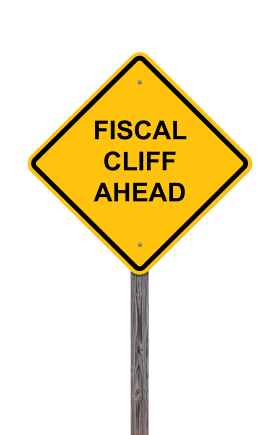2013 is here,  and after months of post-election sound and fury, we took a quick "test leap" off the dreaded "fiscal cliff." Look out below!
and after months of post-election sound and fury, we took a quick "test leap" off the dreaded "fiscal cliff." Look out below!
By this point, we're all familiar with the income tax consequences of the cliff. The Bush tax cuts expired, as scheduled, on December 31, sending everyone's taxes up. The 2% payroll tax holiday expired at the same time, with no hope of resuscitation. The Alternative Minimum Tax (AMT), which up until this week had never been indexed for inflation, still hadn't been "patched" for 2012, meaning it would catch 27 million more Americans in its claws. There are even new Medicare taxes and a 3.8% "unearned income Medicare contribution" on earned income and investment income for individuals earning over $200,000 and joint filers earning over $250,000. (Okay, those new Medicare taxes aren't technically part of the "fiscal cliff" -- but they don't give upper-income earners much reason to cheer 2013, either!)
But the fiscal cliff also threatened some dramatic estate tax changes as well. Taxpayers dying on December 31 could leave a tax-free $5.12 million "unified credit" to their heirs, and pay a 35% rate on any balance above that amount. On January 1, however, that unified credit shrank to just $1 million -- and the tax itself jumped to 55%. Die on December 31 with a $3 million estate and owe Uncle Sam nothing. Die just one day later, and pay a $1.1 million tax. That's one awfully expensive day!
Of course, Washington spent New Year's Day scrambling its way back from the cliff. As we now know, we'll keep the Bush tax rates on incomes up to $400,000 ($450,000 for joint filers) and get a permanent AMT fix. As for estate taxes, the unified credit stays the same and the rate climbs to 40%.
So, here's an awkward question, moot as it now may be. With such large estate taxes at stake, would millionaires choose to die early to spare their heirs the risk of higher taxes?
You probably won't be shocked to learn that determined patients can literally will themselves to delay death past important dates like birthdays, holidays, and anniversaries. Hospitals saw death rates drop significantly in the last week of 1999, only to increase by similar amounts in the first week of 2000. That suggests that patients were determined to catch at least a peek at the new millenium.
A similiar but happier phenomenon can occur when it comes to giving birth. In 2004, the Australian government gave taxpayers a $3,000 new baby bonus, starting on July 1. A 2009 study found that as many as 1,000 births were delayed to take advantage of that windfall.
But dying early to save estate taxes? Really . . . ?
Well, believe it or not, yes. A 2003 study published in the The Review of Economics and Statistics by two economics professors asked if changes in estate tax rates affected mortality rates -- and found that for individuals dying within two weeks of a tax reform, a $10,000 change in estate taxes increased the chance of dying in the low-tax period by 1.6%. This is hardly surprising when living longer let people claim the savings. But the authors even found evidence of people dying sooner to avoid the increases. (That's especially ironic considering that, by definition, nobody gets to enjoy saving tax on their own estate!)
We've said all along that proactive planning is the real key to paying less tax. And smart tax planning lets you pay less and even live to enjoy it! So, we're glad that you're reading these words, and we promise we're here to answer all your questions on the "American Taxpayer Relief Act of 2012"!
Free, No-Obligation Consultation
I would be honored to chat with you about your accounting, tax and finances whether personal or business. I offer a Free, No-Obligation consultation (at your place or mine). During our meeting we will discuss your concerns and questions and let you know how we can help you and our costs. My consultations are not just sales pitches, I will offer you some solid ideas and solutions to help you right off the bat. To schedule a consultation at a time convenient for you, call me at any of offices or call me toll-free at (888) 758-5966 or click here to email me.
I hope you found this information useful. I am excited by the fact that my practice is growing. The key to my firm’s growth — and probably your business too — is referrals from satisfied clients, customers and friends like you. If you know of a friend, colleague or business that would like to grow with us please let me know.
